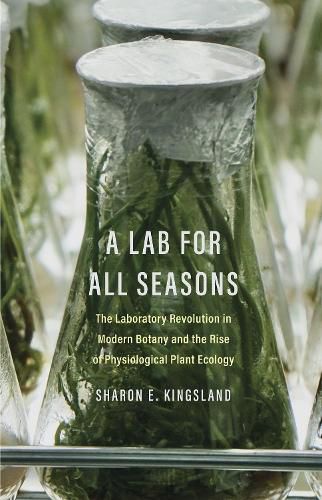Readings Newsletter
Become a Readings Member to make your shopping experience even easier.
Sign in or sign up for free!
You’re not far away from qualifying for FREE standard shipping within Australia
You’ve qualified for FREE standard shipping within Australia
The cart is loading…






The first book to chronicle how innovation in laboratory designs for botanical research energized the emergence of physiological plant ecology as a vibrant subdiscipline
Laboratory innovation since the mid-twentieth century has powered advances in the study of plant adaptation, evolution, and ecosystem function. The phytotron, an integrated complex of controlled-environment greenhouse and laboratory spaces, was invented by Frits W. Went at the California Institute of Technology in the 1950s, setting off a worldwide laboratory movement, and transforming the plant sciences. Sharon Kingsland explores this revolution through a comparative study of work in the United States, France, Australia, Israel, the USSR, and Hungary-in the latter two, offering new interpretations of the response to Lysenkoism in Communist states.
These advances in botanical research energized physiological plant ecology. Case studies explore the development of phytotron spin-offs such as mobile laboratories, rhizotrons, and ecotrons. Scientific problems include the significance of plant emissions of volatile organic compounds, symbiosis between plants and soil fungi, and the discovery of new pathways for photosynthesis as an adaptation to hot, dry climates. The advancement of knowledge through synthesis is a running theme: linking disciplines, combining laboratory and field research, and moving across ecological scales from leaf to ecosystem. The book also charts the history of modern scientific responses to the emerging crisis of food insecurity in the era of global warming.
$9.00 standard shipping within Australia
FREE standard shipping within Australia for orders over $100.00
Express & International shipping calculated at checkout
The first book to chronicle how innovation in laboratory designs for botanical research energized the emergence of physiological plant ecology as a vibrant subdiscipline
Laboratory innovation since the mid-twentieth century has powered advances in the study of plant adaptation, evolution, and ecosystem function. The phytotron, an integrated complex of controlled-environment greenhouse and laboratory spaces, was invented by Frits W. Went at the California Institute of Technology in the 1950s, setting off a worldwide laboratory movement, and transforming the plant sciences. Sharon Kingsland explores this revolution through a comparative study of work in the United States, France, Australia, Israel, the USSR, and Hungary-in the latter two, offering new interpretations of the response to Lysenkoism in Communist states.
These advances in botanical research energized physiological plant ecology. Case studies explore the development of phytotron spin-offs such as mobile laboratories, rhizotrons, and ecotrons. Scientific problems include the significance of plant emissions of volatile organic compounds, symbiosis between plants and soil fungi, and the discovery of new pathways for photosynthesis as an adaptation to hot, dry climates. The advancement of knowledge through synthesis is a running theme: linking disciplines, combining laboratory and field research, and moving across ecological scales from leaf to ecosystem. The book also charts the history of modern scientific responses to the emerging crisis of food insecurity in the era of global warming.